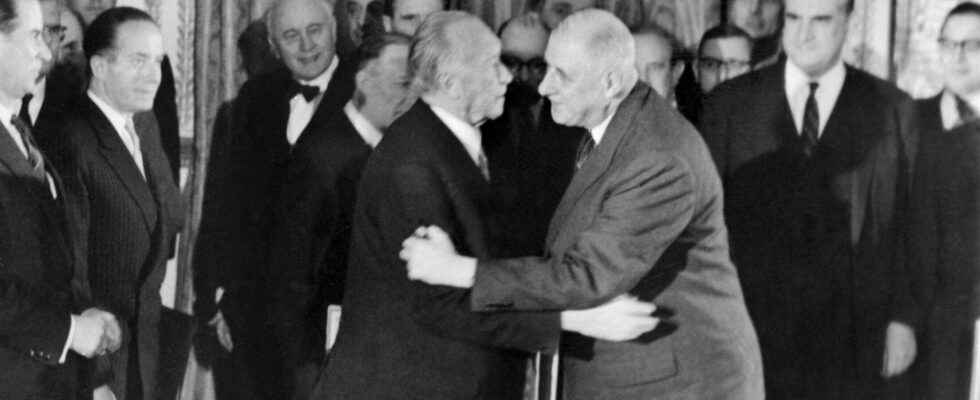The photo is remembered: on January 22, 1963, seated at an oval table under the gilded salon Murat at the Elysée Palace, German Chancellor Konrad Adenauer and General de Gaulle, President of the Republic, initial the “Treaty of ‘Franco-German friendship’, more commonly known as the ‘Elysée Treaty’. To the right of the chancellor stands Gerhard Schröder, his foreign minister (not to be confused with his namesake quoted below). This treaty sets the framework for increased cooperation between France and Germany more than it signs the “reconciliation” between the two countries, which had manifested itself in previous years, particularly in the context of the creation of the Ceca in 1951 and of the European Economic Community in 1957, of which France and Germany constituted the base.
Sixty years later, what remains of the Elysée Treaty and can it continue to irrigate the spirit of Franco-German relations? “Treaties are like roses: they last as long as they last”, de Gaulle is said to have told Adenauer and, in fact, the two countries experienced some difficulty in sharing common views on foreign and defense policy from the outset. . But this text remains “a place of Franco-German memory”, as historian Corine Defrance writes. [1], magnified during the fortieth anniversary in 2003 in Versailles by Jacques Chirac and Gerhard Schröder. Since then, January 22 has officially become “Franco-German Day”.
On the economic level, it is hardly debatable that the two countries have made a spectacular rapprochement. Trade has never been so intense (165 billion euros in 2021), Germany is the leading foreign investor in France in number of projects ahead of the United States, more than 3,000 German companies operate in France and employ approximately 320,000 employees. More than 3,000 French companies are active in Germany and employ more than 300,000 employees. In addition, companies from both countries have forged strategic cooperation in key areas such as the energies of the future, new forms of mobility and environmental technologies. Let’s not forget that with the departure of the United Kingdom from the EU, France and Germany now account for more than 40% of the Union’s GDP.
But we must not forget that the Elysée Treaty was also a response to the debates which then agitated Germany and opposed supporters of a rapprochement with France and “Atlanticists”, who favored the relationship with the United States and Great Britain. With, as a backdrop, the power of the Soviet Union and its positions in Central and Eastern Europe. It is striking to note that these debates are more current than ever with the invasion of Ukraine by Russia, the role of NATO in the defense of Europe and the special relationship which unites Germany with the countries from Eastern Europe. It is therefore useful to rediscover this spirit of the treaty to recall the importance of European sovereignty, whether diplomatic, scientific, industrial or relating to its internal and external security. Joint efforts in the field of electronic components (“European Chips Act”), which aims to reduce dependence on the United States and Asia, is a good example.
Above all, there is an aspect of the Elysée Treaty that we tend to leave somewhat in the dark and which is nevertheless essential: the training of young people. On July 5, 1963, the Franco-German Office for Youth was created, whose mission is to promote exchanges between young people from the two countries. Since its creation, Ofaj has enabled 9.5 million young people to participate in 382,000 exchange programs, “the largest migration of peoples ever organized in peacetime and by peaceful means and intentions”, said Joseph Rowan. However, the issue of training is even more acute today for the two countries than in the 1960s and 1970s. France and Germany are sorely lacking in skilled labor and both countries face the same challenge: to make their vocational training systems attractive and effective for young people. Reinforced Franco-German cooperation in the field of training is necessary to meet the needs of companies in terms of new talent and to promote better appropriation of the language and culture of the partner country. It would be a good way to give a second youth to the Elysée treaty.
* Patrick Brandmaier, Director General of the Franco-German Chamber of Commerce and Industry
[1] The signature of the Elysée “friendship” treaty, by Corine Defrance. France Archives, 2013.
